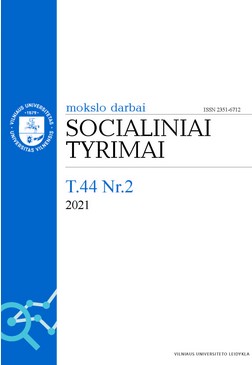Savanorystė Lietuvoje – socialinio kapitalo perspektyva
Volunteering in Lithuania – the perspective of social capital
Author(s): Justinas Staliūnas, Andrius Stasiukynas, Aušra ŠukvietienėSubject(s): Governance, Public Administration, Labor relations, Government/Political systems
Published by: Vilniaus Universiteto Leidykla
Keywords: social capital; volunteering; public governance;
Summary/Abstract: The level of social capital in society is one of the most important elements for the success of state development, which is increasingly emphasized on political agendas. In research, social capital covers a wide range of areas due to the interdisciplinarity of social capital. Still, the dominant components stand out: trust in society, trust in public authorities, involvement in civic activities. While trust in public authorities and trust in other members of society are more often used in research and heard in the media, civic activities often lack such interest. However, it is one of the most effective ways for government decisions to invest most effectively in improving social capital in society. The primary tool for the state to increase public involvement in civic activities is the promotion of voluntary activities, which contributes to the state’s sustainable development, and the creation of the welfare state is enshrined in international documents. With this article, the authors seek to examine the peculiarities of Lithuanian volunteering in the context of social capital formation. The aim is to: 1) examine the theoretical assumptions of the impact of volunteering on the formation of social capital; 2) study the expression of social capital and voluntary activity in the context of state performance evaluation indicators; 3) carry out empirical research (expert interview) examining the peculiarities of volunteering in Lithuania. It should be noted that some of the results of the empirical research were used in the report of the applied research “Development of Youth Volunteering in Lithuania” (prepared by the Lithuanian Council of Youth Organizations (LiJOT) project “Strengthening the Participation of the Lithuanian Council of Youth Organizations in Public Management Decision Making”). The development of volunteering and the improvement of social capital indicators are named Lithuania’s long-term strategic goals, but the indicators in international indices are low compared to other countries. The analysis of the results of the empirical research allows us to state that: 1) In Lithuania, volunteering is often treated in various ways, e.g., in connection with unpaid work or other activities which are not, in principle, activities carried out of the person’s own free will; outstanding long-term and short-term volunteering (up to 6 months); 2) organizers of voluntary activities (usually non-governmental non-profit organizations (NGOs)) lack managerial skills; 3) In recent years, Lithuania has started to develop long-term volunteering programs, which are associated with better social capital formation, and it is expected that this measure will help to improve the quality and indicators of volunteering, especially among young people.
Journal: Socialiniai tyrimai
- Issue Year: 44/2021
- Issue No: 2
- Page Range: 49-60
- Page Count: 12
- Language: Lithuanian

